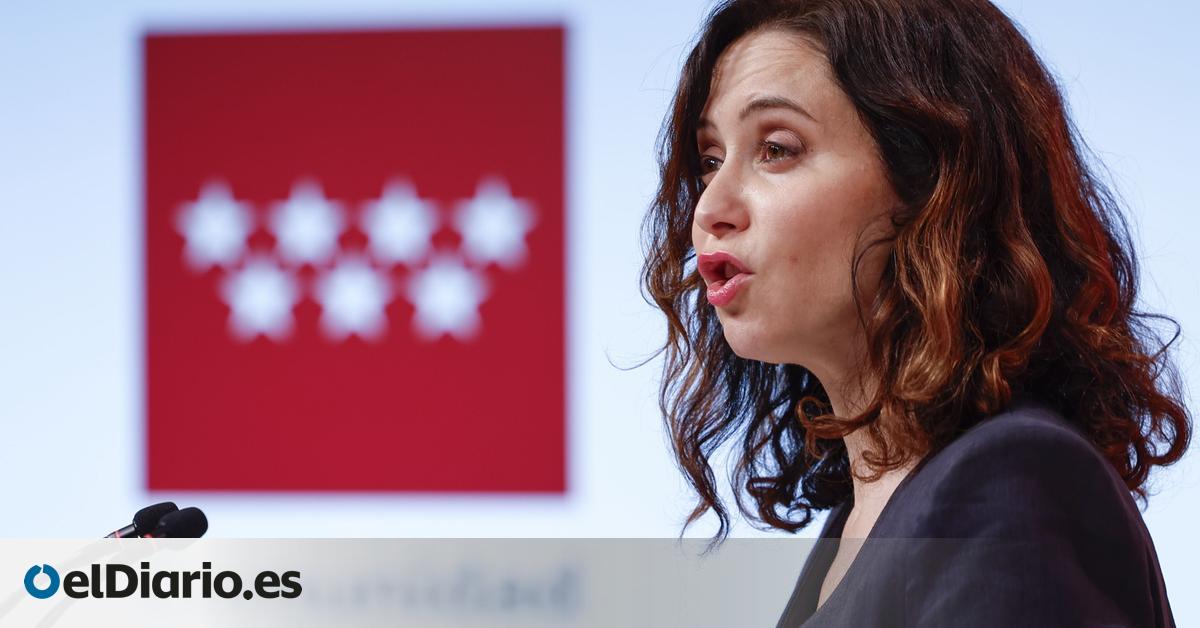
“All this is being mixed in a scandalous political persecution where everything smells shady and shady because of how the inspection began.” Isabel Díaz Ayuso waited a few hours after elDiario.es published that the Prosecutor’s Office had denounced her partner to kick off the conspiracy theory. A speech that attempted to put under suspicion the initial Treasury inspection of his partner, the entire investigation and the final complaint. Two prosecutors directly involved in the case, Julián Salto and Almudena Lastra, testified this Thursday in the Supreme Court and explained the detail that destroys that theory: neither the Madrid Prosecutor’s Office nor the General Prosecutor’s Office knew who Alberto González Amador was until days after the case was already in the hands of the judges.
The environment of the president of the Community of Madrid dedicated their efforts to keeping her partner anonymous when it emerged in 2021 that they were in a relationship. Presented as a “health technician” in the first chronicles, Alberto González Amador was actually a supplier who worked for the health giant Quirón and who had become rich with million-dollar commissions during the pandemic in operations for the purchase and sale of masks thanks to the commission of a company. which was managed by his direct boss in Chiron. Once the exclusive from elDiario.es was known about the complaint that the Prosecutor’s Office had filed against him for defrauding 350,000 euros using a network of false invoices, the strategy of Ayuso and his chief of staff, Miguel Ángel Rodríguez, was to draw an alleged plot of State against “an individual” to harm the regional president.
The reality, according to the evidence that exists both in the court that investigates tax fraud and in the Supreme Court that is investigating a crime of revealing secrets that the leadership of the State Attorney General’s Office has been charged with, is that the prosecutors accused of leak their email, they did not know that they were a couple until the complaint was already in the hands of the judges. Nor did they know that, throughout the fiscal and criminal process, his lawyer acknowledged his guilt several times in search of a pact or an escape route that would avoid jail. All while Ayuso and her entourage spread falsehoods such as that there was no fraud and in reality, it was the Treasury who owed money to the businessman.
Almudena Lastra, Madrid’s chief prosecutor, was the first to testify. Very critical for months of the Attorney General’s management in those days of March, the former member of the Judiciary has shown her past and present suspicions that the leak of the email with González Amador’s confession came from the Prosecutor’s Office. He even asked Álvaro García Ortiz directly if he had passed the document to the press. And he has provided the information of when he learned who was accused in that case of tax fraud: March 7, 2024. Two days after the complaint was filed in the Plaza de Castilla courts in Madrid. Almost two years after the Treasury began to suspect his tax returns.
Julián Salto is the prosecutor specializing in economic crimes who took over the Treasury investigation and ended up denouncing Alberto González Amador. His proceedings began on January 23, 2024 and on March 5 of that year he filed the complaint in the Madrid courts. As he said this Thursday before magistrate Ángel Hurtado, forced to tell the truth, he found out that González Amador was Isabel Díaz Ayuso’s partner three days later, on March 8, when one of his superiors, Virna Alonso, told him. Once he knew it, he also had the deference to send the complaint to the businessman’s lawyer by mail instead of making him wait for it to reach him through court weeks later.
The messages and emails intercepted by the Central Operational Unit (UCO) of the Civil Guard on the phone of Pilar Rodríguez, the accused provincial prosecutor, also point in the same direction: when the complaint was filed in court, the Prosecutor’s Office did not know Who was Alberto González Amador and his cause, in fact, had not reached the top of the organization through a vertical channel until the end of the first week of March, two months after the opening of proceedings, once the complaint had been filed and almost two years after the start of the inspection prosecutor. Isabel Díaz Ayuso, a few hours after the elDiario.es exclusive, came to attribute the process against her partner to the fact that the provincial prosecutor was a high-ranking official of Justice with José Luis Rodríguez Zapatero.
Lastra y Salto’s statements in the Supreme Court, similar to those already offered in the Superior Court of Madrid, dismantle the thesis of political persecution that Ayuso and her cabinet have put forward since this medium revealed her partner’s double tax fraud. The same strategy that Miguel Ángel Rodríguez and the president’s entourage pursued when they leaked to various media that it had been the prosecutor in the case who had proposed an agreement, which according to the chief of staff had been stopped by “orders from above.” According to that story, which the attorney general ordered to combat on the night of the leak with a press release that is at the origin of his accusation, Rodríguez intended to show that the Prosecutor’s Office was following political instructions to stretch the case of González Amador’s fraud. The first information, published by the newspaper El Mundo at 9:29 p.m. that night, pointed in that sense, omitting that the offer had come from the businessman and not the other way around.
Rodríguez himself has already declared before the Supreme Court that he had no proof of this falsehood and that what he leaked to various media outlets was an “opinion” and not information because he has been in politics for many years and is already “combing his gray hair.” Everything was false, as has been demonstrated in the various appearances, including his, in court.
Accusations against Alberto González’s lawyer
The case of the double fraud for which Alberto González Amador will have to appear as a defendant on February 7, the fourth attempt to take a statement from the businessman, did not start with “a Treasury inspection that got out of hand” as Isabel also stated. Díaz Ayuso shortly after the case broke out. The tax and judicial documentation reveals that the alarms went off in the Tax Agency when the inspectors verified that González Amador’s company had invoiced six times more in 2020 and 2021 than in previous years and that, however, it had declared fewer benefits and paid less. for Corporate Tax.
What the Treasury found was not a tax discrepancy or incorrectly imputed expenses but a network of false invoices for 1.7 million that has led to the accusation of several people and companies, also pending declaration. González Amador’s defense strategies throughout the process also point in the opposite direction: that he knew that he had acted illegally. First he tried to withdraw several invoices for work that was never done. Then, pay your debts and possible fines in the 2022 declaration, a maneuver rejected by the treasury. Finally, his lawyer got to work to seek an agreement a month before being denounced, a movement traditionally reserved for the dates close to the trial.
In the Supreme Court, Judge Hurtado investigates whether on the night of March 13 the attorney general or someone under his command spread to the press that email in which the lawyer Carlos Neira acknowledged, on behalf of his client, his tax fraud of 350,000 euros and offered to pay half a million euros and accept eight months in prison in exchange for not going to prison and closing the case with as little noise as possible. The magistrate is convinced, in the absence of taking statements from the accused, that Álvaro García Ortiz led a strategy to leak this information to politically harm Isabel Díaz Ayuso, a strategy in which he even involves Moncloa, without providing any evidence of this. beyond a UCO report that, based on deductions, pointed out the “preeminent” participation of García Ortiz in the leak.
The case began months ago in the Superior Court of Justice of Madrid when Alberto González and the Madrid Bar Association denounced that a statement from the Prosecutor’s Office had revealed confidential details of the possible agreement and that this, in addition to being criminal, had affected their rights. of defense. What they did not explain in their complaints and complaints is what Miguel Ángel Rodríguez, Ayuso’s chief of staff in the Community of Madrid, has revealed these weeks, as a witness and forced to tell the truth: one of González Amador’s lawyers put into question circulated an email from prosecutor Julián Salto that, through Rodríguez, was published by a dozen media outlets on the night of March 13.
This was stated by Ayuso’s chief of staff in his appearance before the judge, trying to clarify before the microphones that it had actually been Alberto González Amador who had sent him the email. This Thursday, before the judge, prosecutor Julián Salto has accused lawyer Carlos Neira of violating the duty of confidentiality by passing that email to Miguel Ángel Rodríguez, something that he did not know at the time and which he has learned about from the press. Lastra had already made that same complaint in the Superior Court and had even trusted that the Madrid Bar Association would file charges against the lawyer who leaked the first communication through Ayuso’s chief of staff. The Madrid Bar Association, which filed a complaint with the prosecutor’s office after understanding that he revealed secrets after dismantling that hoax, has never acted against the lawyer Carlos Neira.
Judge Hurtado will take statements, also as witnesses, from those responsible for communication of the Attorney General’s Office and the Madrid Prosecutor’s Office before receiving, now as investigated, the three suspects: the attorney general Álvaro García Ortiz, the provincial prosecutor Pilar Rodríguez and to the lieutenant prosecutor of the Technical Secretariat, Diego Villafañe, whom he accuses of having leaked that documentation. It is based on the efforts they made during the night of March 13, in which several media published the false accusation that the prosecutor’s office was acting under political orders against Ayuso’s partner, to compile documentation that would serve to deny this hoax. Including the confession email from Ayuso’s partner that eldiario.es published after it was reported by other media such as Cadena Ser and La Sexta.
Both the editor of the Ser chain that published the news, and the deputy director of elDiario.es, José Precedo, declared before the Supreme Court that both had that email before El Mundo disseminated this manipulated information, something that would dismantle the accusation of the revelation of secrets. Judge Ángel Hurtado did not take these testimonies into account and alleged in an order that the two journalists did not present objective evidence, since both took advantage of their constitutional right to protect sources.
In parallel, the Madrid judge has called the businessman to testify, who on February 7 will face his fourth summons as an investigator in the case and whom the Prosecutor’s Office accuses of a fourth crime, in addition to the two of tax fraud and that of documentary falsification, which González Amador was willing to recognize in the last agreement with the public ministry last summer, a quarter of corruption in business, for the payment of half a million euros for an empty company to his boss’s wife in Quirón, Fernando Camino, company administrator Mape, who with his request promoted the commission of two million euros that is at the beginning of this entire case.
Source: www.eldiario.es

